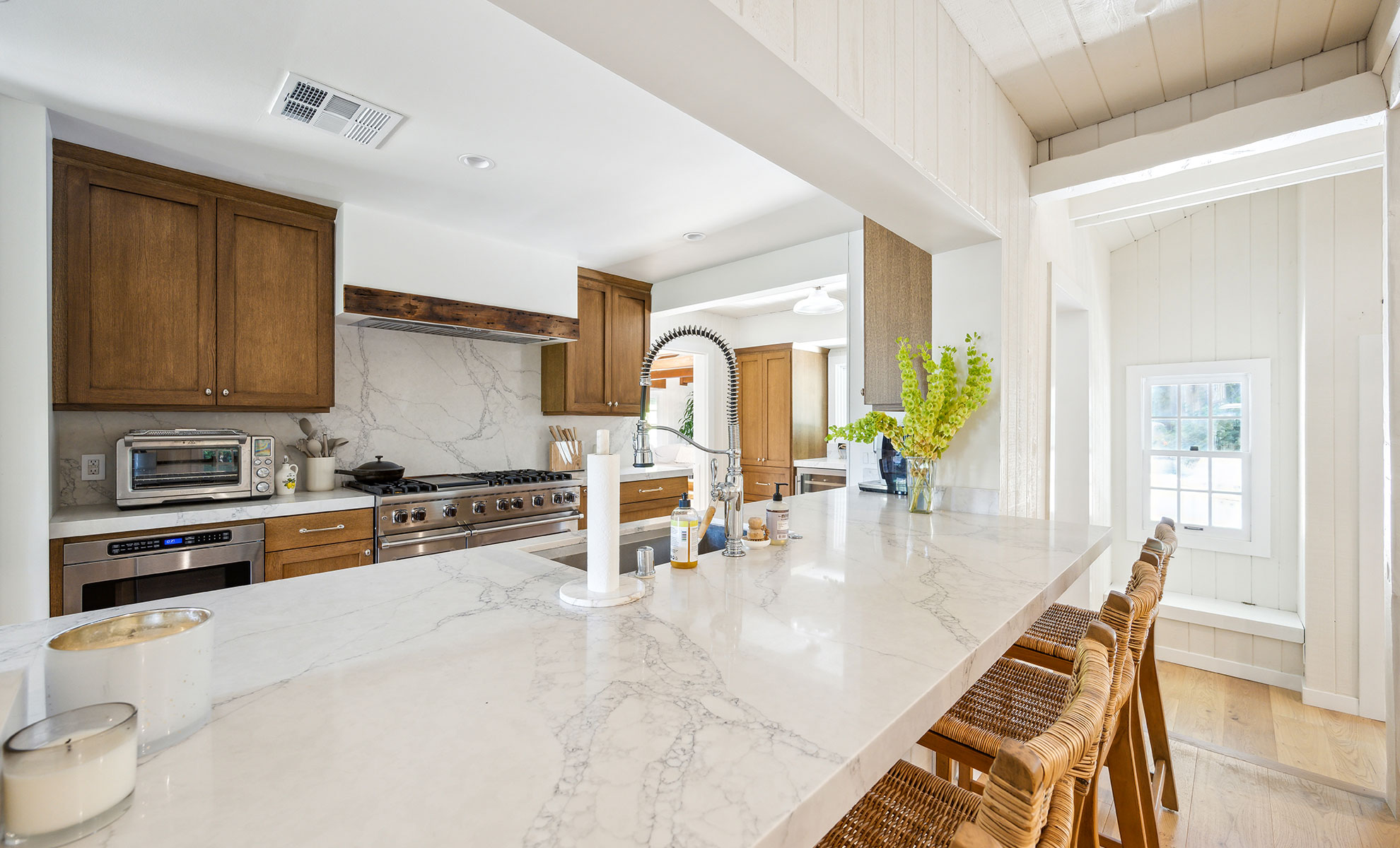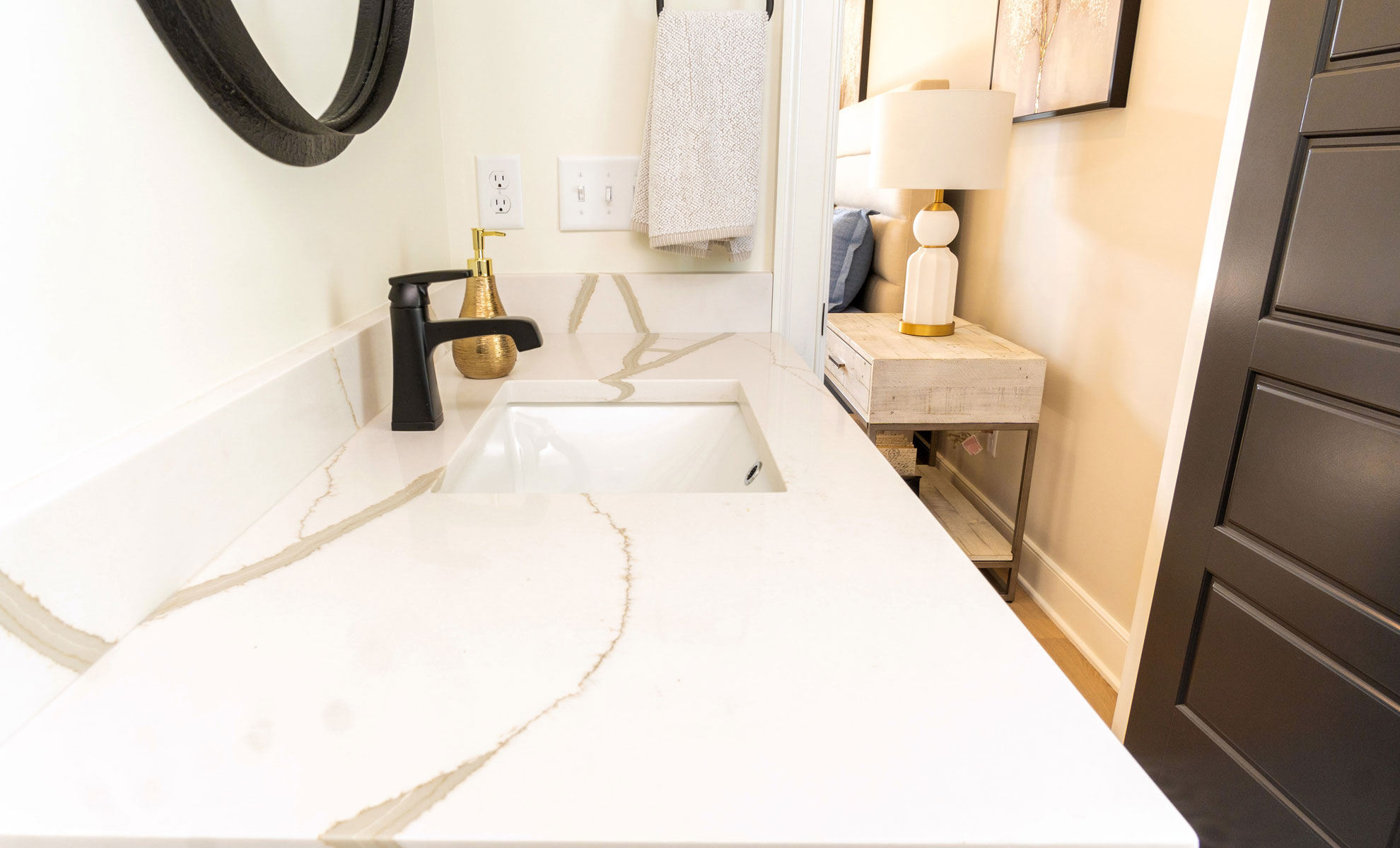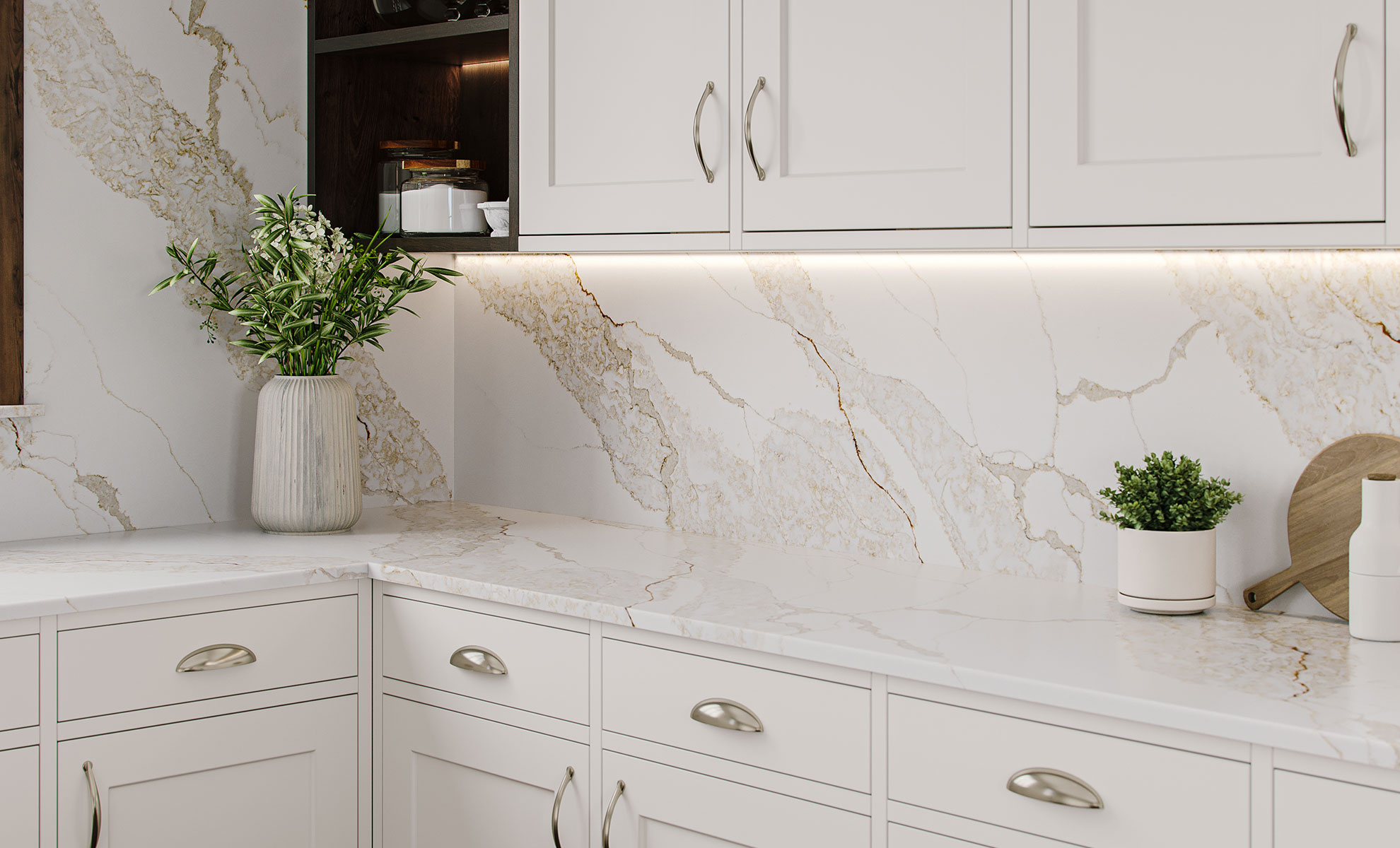Quartz and quartzite are known for their beauty and durability. However, despite their similar names, they differ in composition, maintenance needs and appearance.
Understanding the key differences between quartz and quartzite can help you determine which material might be the best fit for your next home improvement project. Whether you’re renovating a kitchen or designing a new space, here’s everything you need to know about quartz vs quartzite.
What is Quartz?
Quartz is a man-made material that has become popular for countertops and other home design applications thanks to its remarkable durability and aesthetic versatility.
Composed primarily of natural quartz crystals — one of the hardest minerals on Earth — this engineered stone is created by combining roughly 90% to 95% ground quartz with polymer resins and pigments. This mixture is then cured and molded into slabs under high pressure and heat.
This blend is then combined with 5% to 10% resins, polymers and pigments, resulting in a non-porous, extremely hard surface that is resistant to scratches, stains and heat.
Due to its engineered nature, quartz is incredibly durable, resistant to chips and less likely to crack than natural stone options. The non-porous surface also makes it resistant to bacteria and mold, a significant advantage for quartz kitchen countertops.
What is Quartzite?
Quartzite is a natural stone often chosen for sophisticated design projects, including countertops and other high-traffic areas, due to its stunning appearance.
Unlike quartz, which is engineered, quartzite is formed naturally through the metamorphism of sandstone — a process that occurs over millions of years. This transformation results in a hard, dense stone that combines marble’s beauty with granite’s strength.
Quartzite is primarily composed of quartz, which gives it its signature hardness. During its formation, sandstone is subjected to extreme heat and pressure, which causes the quartz grains within the sandstone to recrystallize and bond together to create a dense and durable stone.
Quartzite is one of the hardest natural stones available, often ranking around 7 on the Mohs scale of hardness (just below diamonds and harder than granite). This makes it highly resistant to scratches and wear. However, unlike quartz, quartzite is porous, meaning it requires sealing to prevent staining from liquids like wine, coffee or oil.
Quartz vs Quartzite: Setting Apart
From durability and maintenance requirements to aesthetic appeal, some factors to consider when choosing quartz vs quartzite for your next project include appearance, durability and performance, maintenance requirements, cost and more.
Appearance

Quartz offers a broad range of colors and patterns, including options that replicate the look of natural stones like marble and granite.
The consistent patterns and colors are a result of its engineered nature, creating a uniform appearance throughout. This uniformity makes quartz an excellent choice for achieving a sleek, modern aesthetic and ensuring a consistent look across large surfaces and multiple installations.
Quartzite, on the other hand, is celebrated for its natural beauty. Each slab features distinct veining and color variations resulting from its geological formation, providing a unique look that adds character and elegance to any space. The natural variations in quartzite mean that no two slabs are the same, making it a compelling option for those seeking a luxurious touch that highlights the inherent beauty of natural stone.
Durability and Performance
Known for its hardness and resistance to scratches, quartz performs exceptionally well in high-traffic areas. Its non-porous surface is resistant to stains and bacteria, making it a durable choice for countertops and other surfaces.
Quartz kitchen countertops are ideal for busier families, offering unrivaled durability and ease of maintenance. Its uniform structure also helps prevent the development of cracks or chips, contributing to its long-lasting performance.
Quartzite is one of the hardest natural stones, offering superior durability and scratch resistance. Its resilience to heat and pressure makes it a go-to option for demanding applications, such as kitchen countertops.
However, its porous nature means it can be susceptible to stains if not properly sealed, necessitating regular maintenance to preserve its appearance.
Maintenance Requirements

Quartz countertop maintenance is simple due to its non-porous surface, which doesn’t require sealing.
Regular cleaning with mild soap and water is usually sufficient to keep it looking its best. Quartz countertops also resist staining and don’t harbor bacteria, reducing the need for frequent deep cleaning.
Quartzite requires more maintenance, including periodic sealing to prevent staining and moisture absorption. While cleaning is straightforward, it’s essential to use gentle products to preserve the sealant.
This added maintenance is a trade-off for quartzite’s unique and luxurious appearance, which demands more attention to maintain its pristine look over time.
Cost Considerations
Generally, quartz tends to be more affordable than quartzite. The cost can vary based on brand, color and pattern, but it’s typically less expensive due to its engineered nature and availability.
This makes quartz a popular choice for those looking for a cost-effective solution without compromising on style and functionality.
Quartzite is often more expensive, reflecting its natural rarity and the complex processes involved in quarrying and fabricating it. The price can fluctuate based on factors such as the stone’s origin, color, veining and the rarity of the specific type of quartzite.
Application in Home Designs

Versatile and available in a wide range of designs, quartz is perfect for countertops, backsplashes and even flooring. Its consistency makes it ideal for modern, cohesive designs where a uniform appearance is desired.
Quartzite’s variation makes it popular for high-end countertops, backsplashes and accent features, and its unique veining and color variations often become focal points in design.
Quartzite is frequently used in projects that emphasize natural stone aesthetics and seek to incorporate distinctive, eye-catching elements.
Environmental Impact
The environmental impact of quartz can be significant due to the manufacturing process, which involves using resins and pigments that may not be biodegradable.
However, many manufacturers are increasingly adopting more sustainable practices, such as using recycled materials and reducing waste, to minimize their environmental footprint.
As a natural stone, quartzite has a relatively lower environmental impact compared to engineered stones, primarily because it doesn’t require synthetic materials in its production.
However, quarrying and transportation pose environmental considerations, including resource extraction, habitat disruption and energy consumption.
Popularity and Market Trends

Quartz has become increasingly popular due to its affordability, wide range of designs and low maintenance. It’s a preferred choice for homeowners looking for consistency and durability, offering a practical solution that fits various design styles.
Meanwhile, quartzite is trending in high-end home design for its distinctive, natural appearance and durability. Its popularity is driven by its luxurious aesthetic, which adds a touch of sophistication to any space, and the growing appreciation for natural materials in designs.
Quartz vs Quartzite: Discover the Perfect Fit
Whether you’re drawn to the sleek, consistent look of quartz or the unique, natural elegance of quartzite, both materials are outstanding options for enhancing any home.
Quartz countertops provide a durable, low-maintenance solution with a wide range of designs while quartzite brings natural beauty and exceptional strength.
At Vadara Quartz, we offer exceptional quartz solutions that capture the essence of nature’s most beautiful places. Our designers transform natural inspiration into handcrafted quartz surfaces, ensuring each piece embodies beauty and quality.
Discover how our high-quality products can transform your projects today.



